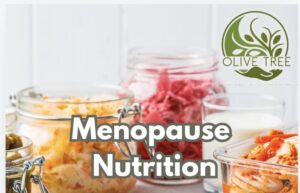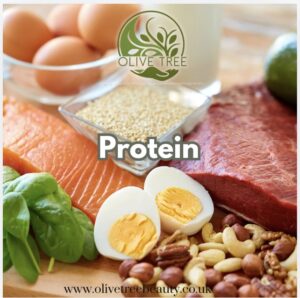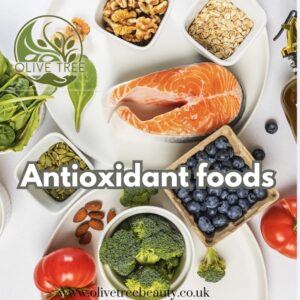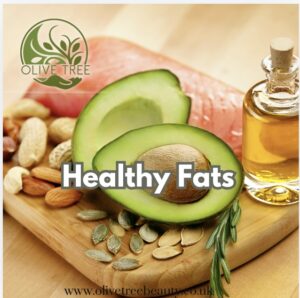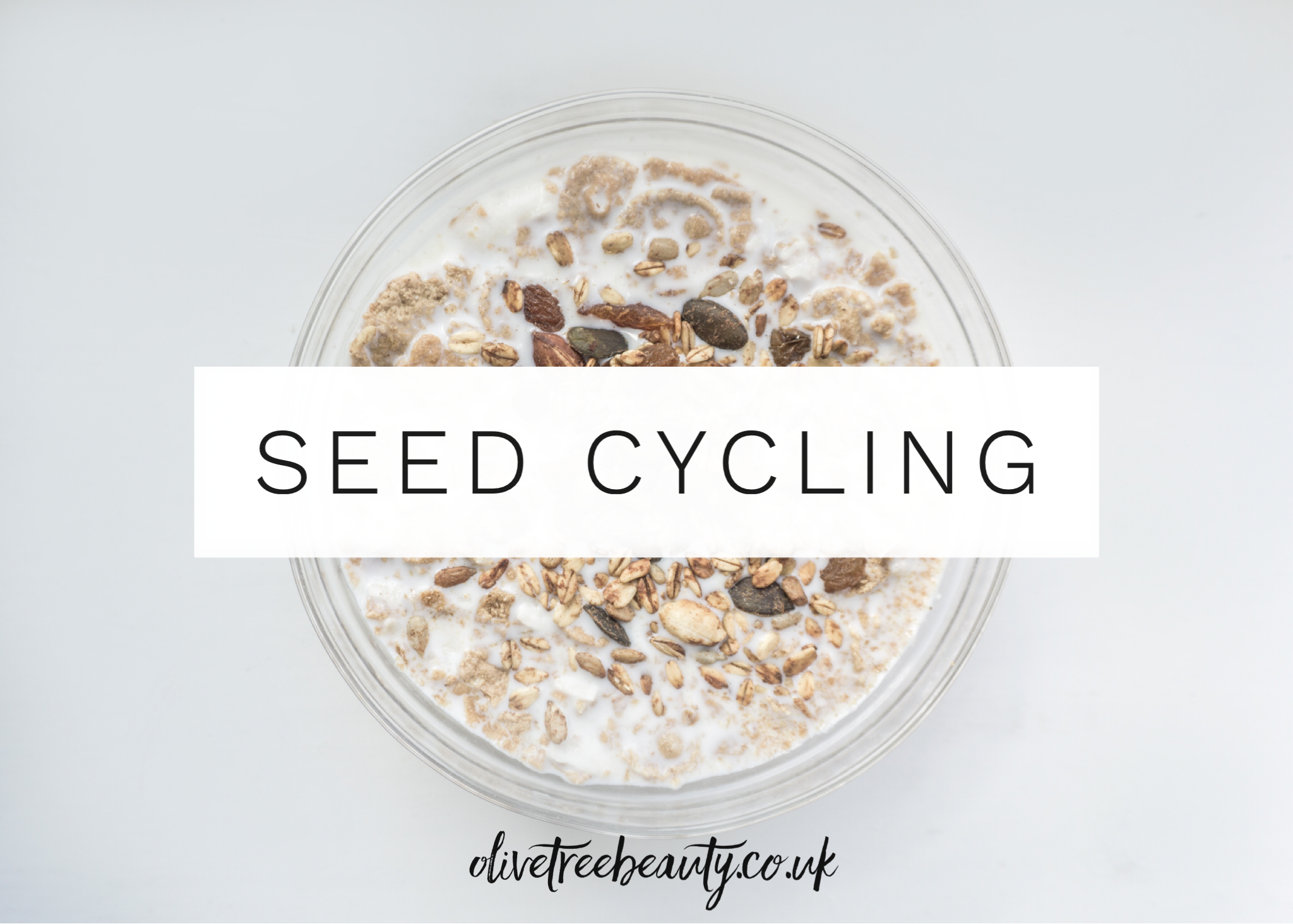What to eat during menopause ?
This is a question I get asked a lot, and it’s totally understandable. With all the conflicting info out there, nutrition can feel overwhelming. So, I’ve done the research to make it easier for you. Here are my top recommendations for what to eat during menopause to help you navigate this stage of life and support your body with the right nutrients.
1. Protein
2. Prebiotics & Probiotics:
3.Phytoestrogens
4. Anti-inflammatory foods
5. Calcium-rich foods
6. Antioxidant-Rich Foods
7. Healthy Fats
8. Water
1. Protein
As we hit mid-life, our protein needs to increase.
Protein is especially important during menopause for several key reasons:
- Muscle Mass Maintenance – As oestrogen levels decline during menopause, women may experience a loss of muscle mass (sarcopenia). Consuming adequate protein helps maintain and build muscle, which is crucial for strength, mobility, and overall physical function.
- Metabolism Support – Protein has a higher thermic effect than fats or carbohydrates, meaning it takes more energy to digest. This can help support a healthy metabolism, which may slow down during menopause, aiding in weight management.
- Bone Health – Protein plays a role in bone health, working in conjunction with calcium and vitamin D to help maintain bone density. Adequate protein intake can help mitigate the risk of osteoporosis, which increases post-menopause due to declining oestrogen levels
- Hormone Regulation – Protein is involved in the production of hormones and neurotransmitters. Consuming enough protein can help support hormonal balance, which is crucial during the fluctuations experienced in menopause.
- Satiety and Weight Management – Protein is more satiating than carbs or fats, which can help control hunger and reduce cravings. This is particularly important during menopause when weight gain can become more challenging due to hormonal changes
- Skin Health – Protein is essential for collagen production, which helps maintain skin elasticity and structure. During menopause, skin may become drier and lose elasticity, so adequate protein can support skin health.
- Energy Levels – Protein provides essential amino acids that are vital for energy production and overall vitality. Consuming protein-rich foods can help sustain energy levels, which may fluctuate during menopause.
Recommended Protein Sources:
Lean meats: Chicken, turkey, and fish
Plant-based proteins: Lentils, beans, chickpeas, and tofu ( personally I love smoked tofu, have you tried it ? )
Dairy: Greek yogurt, cottage cheese, and milk
Nuts and seeds: Almonds, walnuts, chia seeds, and hemp seeds ( I make granola with mine )
How Much Protein to Aim For: A general guideline is to aim for about 20-25 grams of protein per meal and 10-15 grams per snack. This can vary based on individual needs, activity levels, and health goals. Incorporating adequate protein into your diet during menopause can help address the unique challenges of this stage, promoting better overall health and well-being.
2. Prebiotics & Probiotics
Gut health is more important than ever during menopause. Hormonal changes can mess with your gut bacteria, so adding prebiotics and probiotics is key to keeping things balanced.
What are Prebiotics ?
They are a type of fibre that feed the beneficial bacteria (probiotics) in your gut, helping them grow and thrive. Unlike probiotics, which are live bacteria, prebiotics are non-digestible compounds found in certain foods that pass through the digestive system and act as “food” for the good bacteria.
Common Sources of Prebiotics:
– Fruits – Bananas, apples, berries
– Vegetables – Onions, garlic, leeks, asparagus, artichokes
– Whole Grains – Oats, barley, wheat bran
– Legumes – Beans, chickpeas, lentils
By supporting healthy gut bacteria, prebiotics play a role in improving digestion, boosting immunity, and even aiding in better nutrient absorption. They’re essential for maintaining a healthy gut microbiome, which impacts overall health, especially during times of hormonal change like menopause.)
Get your prebiotics from fruits, veggies (like bananas, onions, garlic, and leeks), beans, and whole grains.
Probiotics? Think fermented foods like yogurt, kefir, and cheeses with live cultures. Sauerkraut, kimchi, and miso are also great options.
Probiotics’ role:
- Probiotics help maintain a balanced gut microbiome, improving digestion and nutrient absorption.
- By supporting gut health, probiotics may help regulate oestrogen levels, potentially alleviating some menopause symptoms.
- Some studies suggest that probiotics can improve mood and reduce anxiety, likely through the gut-brain axis, which links gut health to mental well-being.
- Probiotics support immune health by enhancing the gut barrier function and promoting the production of antibodies.
- Some research suggests that certain probiotic strains may aid in weight management by influencing fat storage and appetite regulation.
S. K. et al. (2020): – “The role of gut microbiota in the gut-brain axis and its impact on mental health.”
Journal: Frontiers in Neuroscience – Summary: This paper reviews the mechanisms by which gut microbiota can influence mental health and discusses the potential of probiotics to modulate mood and anxiety. – Reference: DOI: 10.3389/fnins.2020.00716
3. Phytoestrogens
These plant-based compounds, found in foods like flaxseeds and soy, may help ease some menopause symptoms and support heart health, which becomes even more important as oestrogen levels drop. As oestrogen levels decline during menopause, phytoestrogens can provide a mild oestrogenic effect, potentially easing symptoms such as hot flushes, night sweats, and mood swings.
Phytoestrogens may help protect against bone loss by supporting bone density. This is particularly important during menopause when the risk of osteoporosis increases. By mimicking oestrogen, phytoestrogens may help improve cholesterol levels and support cardiovascular health, reducing the risk of heart disease, which can rise post-menopause.
*Some studies suggest that phytoestrogens may reduce the severity and frequency of menopausal symptoms, such as hot flushes and vaginal dryness.
A 2020 Clinical Trial:
- Wang, H., et al. (2020). Flaxseed and its bioactive components in the management of menopausal symptoms: A systematic review and meta-analysis. Journal of Functional Foods, 64, 103708. DOI: 10.1016/j.jff.2019.103708
How to Incorporate Phytoestrogens
- Add soy to stir-fries, smoothies, or salads.
- Sprinkle flaxseeds on yogurt, oatmeal, or in smoothies.
- Snack on nuts like almonds or walnuts.
- Include legumes in soups, stews, or salads.
- Opt for whole grains in place of refined grains.
Try adding 2-3 servings of soy foods (like tofu, tempeh, or soy milk) and 1-2 tablespoons of ground flaxseed daily. Flaxseeds are great in yogurt, cereal, or smoothies.
*Considerations
Moderation: While phytoestrogens can be beneficial, it’s important to consume them in moderation and as part of a balanced diet.
Individual Response: Not all women may respond to phytoestrogens in the same way. Some may find them helpful, while others may not experience significant benefits.
Consult Healthcare Providers: If considering phytoestrogen supplements or significant dietary changes, it’s a good idea to consult with a healthcare professional, especially if you have a history of hormone-sensitive conditions.
4. Anti-inflammatory foods:

An anti-inflammatory diet is all about whole, plant-based foods that help reduce inflammation in the body.
To make it easy, aim to eat a rainbow of colourful fruits and veggies every day. Think spinach in your scrambled eggs or kale in your smoothie! Even adding cauliflower rice to your meals is a great way to boost fibre and nutrients.
Here are some key anti-inflammatory foods to consider incorporating into your diet:
Fatty Fish – Rich in omega-3 fatty acids (EPA and DHA), fatty fish like salmon, mackerel, sardines, and trout help reduce inflammation and support heart health.
Berries – Blueberries, strawberries, raspberries, and blackberries are packed with antioxidants and phytochemical’s that combat oxidative stress and inflammation. ( great added to your porridge or greek yoghurt for breakfast)
Leafy Greens – Vegetables like spinach, kale, and Swiss chard are rich in vitamins, minerals, and antioxidants that help fight inflammation and promote overall health.
Nuts and Seeds – Almonds, walnuts, chia seeds, and flaxseeds are good sources of healthy fats, fibre, and antioxidants that can reduce inflammation and support heart health.
Side note about flaxseeds , I prefer to use Ground flaxseeds which are generally recommended over whole flaxseeds for several key reasons:
- Whole flaxseeds have a hard outer shell that is difficult for the body to break down
- When flaxseeds are ground, your body can more easily access and absorb the nutrients, making them far more beneficial.
- Flaxseeds are one of the richest plant-based sources of alpha-linolenic acid (ALA), a type of omega-3 fatty acid important for heart health. Ground flaxseeds ensure your body can absorb these healthy fats better than whole seeds.
- Ground flaxseeds contain lignans, plant compounds that may help balance hormones by mimicking oestrogen in the body. These compounds are more bioavailable when the seeds are ground, potentially making them more effective for managing menopausal symptoms.
- Ground flaxseeds are a great source of dietary fibre, which helps regulate digestion and prevent constipation. The fibre is more accessible in ground form, helping to improve gut health. To prevent oxidation and maintain freshness, store ground flaxseeds in an airtight container in the fridge or freezer, as they spoil more quickly than whole seeds.In short, ground flaxseeds offer better nutrient absorption and health benefits, especially for women in menopause, making them the preferred choice.
Olive Oil – Extra virgin olive oil is high in monounsaturated fats and contains antioxidants, particularly oleocanthal, which has anti-inflammatory properties similar to those of ibuprofen.
Tomatoes – Tomatoes are rich in lycopene, an antioxidant that has been shown to reduce inflammation. Cooking tomatoes (e.g, in sauces) can increase lycopene absorption.
Turmeric – Turmeric contains curcumin, a powerful anti-inflammatory compound. Adding turmeric to your meals can help reduce inflammation and support joint health.
Ginger – Ginger has strong anti-inflammatory properties and can help alleviate discomfort, especially related to joint pain and digestive issues.
Whole Grains – Whole grains like quinoa, brown rice, and oats are high in fiber, which can help reduce inflammation and support gut health.
Legumes – Beans, lentils, and chickpeas are rich in fiber, protein, and antioxidants, which can help manage inflammation and promote heart health.
Dark Chocolate – Dark chocolate (70% cocoa or higher) contains flavonoids that have antioxidant and anti-inflammatory effects. Enjoy it in moderation for a healthy treat.
Avocados – Avocados are high in monounsaturated fats and antioxidants, which can help reduce inflammation and support heart health.
Fermented Food – Foods like yogurt, kefir, sauerkraut, and kimchi contain probiotics that promote gut health, which is linked to reduced inflammation in the body.
Green Tea – Rich in polyphenols and antioxidants, green tea has been shown to reduce inflammation and may support weight management.
Aim for variety: Include a colourful array of fruits and vegetables to maximise nutrient intake.
Cook with healthy fats: Use olive oil or avocado oil in cooking instead of butter or processed oils.
Experiment with spices: Add turmeric and ginger to smoothies, soups, or stir-fries for extra flavour and health benefits.
Stay hydrated: Drink plenty of water and consider green tea as a hydrating beverage.
Incorporating these anti-inflammatory foods into your diet during menopause can help manage symptoms, support overall health, and reduce the risk of chronic diseases.
5. Calcium-rich foods
- Bone health matters big time in menopause, calcium helps keep your bones strong.
- Adequate calcium intake helps maintain bone density and strength, reducing the risk of osteoporosis.
- Sufficient calcium levels can contribute to overall cardiovascular health, which is particularly important post-menopause when the risk of heart disease increases.
- Adequate calcium supports muscle strength and reduces the risk of muscle cramps, which can be more common during menopause.
- Maintaining adequate calcium levels can support hormonal health, which can help manage menopause symptoms.
The goal? 1200 mg a day.
Dairy like milk, cheese, and yogurt are classic sources, but don’t forget about fortified orange juice, leafy greens (like kale and spinach), broccoli, soy foods, and even sardines or trout. ( who doesn’t love a cheese board )
What does the Department of Health and Social Care advise?
-
You should be able to get all the calcium you need by eating a varied and balanced diet. If you take calcium supplements, do not take too much as this could be harmful. Taking 1,500mg or less a day is unlikely to cause any harm. (https://www.nhs.uk/conditions/vitamins-and-minerals/calcium/
Tips for Calcium Absorption
- Vitamin D: Ensure adequate vitamin D intake, as it aids in calcium absorption. Sunlight exposure and fortified foods can help.
- Balanced Diet: Pair calcium-rich foods with magnesium and potassium sources, as they support overall bone health.
- Limit Excessive Caffeine and Sodium: High intakes can affect calcium absorption.
6. Antioxidant-Rich Foods
Antioxidant-rich foods are particularly beneficial during menopause as they help combat inflammation, reduce oxidative stress, and support overall health during this hormonal transition.
Here’s a list of powerful antioxidant-rich foods to include in your diet during menopause:
- Berries like blueberries, strawberries, raspberries, and blackberries are loaded with antioxidants such as vitamin C and anthocyanins, which help reduce inflammation and support brain and heart health.
Tip – Add them to smoothies, yogurt, or oatmeal for a nutrient boost. ( add colour to your smoothie too ) - Dark Leafy Greens -Kale, spinach, Swiss chard, and arugula are rich in vitamins A, C, and K, along with antioxidants to protect your eyes and skin, include them in salads, stir-fries, or smoothies.
- Cruciferous Vegetables – Broccoli, cauliflower, Brussels sprouts, and cabbage contain compounds like sulforaphane, which may help balance oestrogen and protect against cancer. Steam, roast or add them to soups and stews for a crunchy, nutritious addition.
- Nuts & Seeds – Almonds, walnuts, flaxseeds, and chia seeds are high in vitamin E, healthy fats, and antioxidants that protect your heart and support skin health. Sprinkle them on salads or yogurt, or blend them into smoothies for an extra dose of antioxidants.
- Tomatoes – Rich in lycopene, a powerful antioxidant, tomatoes help protect the skin from sun damage and support heart health, which is important as heart disease risk increases after menopause. Eat them raw in salads or cook them in sauces to maximise lycopene absorption.
- Citrus Fruits – Oranges, lemons, grapefruits and limes are packed with vitamin C, which supports immune function and helps maintain collagen for skin elasticity. Use fresh citrus to flavour your water, dressings or as a snack.
- Green Tea – contains catechins, a type of antioxidant that supports metabolism, reduces inflammation and may help manage weight. Enjoy a cup of green tea daily to help protect against heart disease and support brain function.
- Dark Chocolate – (70% or higher) Rich in flavonoids, dark chocolate can help improve blood flow, reduce inflammation, and boost mood, perfect for managing menopause-related stress. Enjoy a small piece of dark chocolate as an antioxidant-rich treat.
- Carrots & Sweet Potatoes – These orange veggies are packed with beta-carotene, which converts to vitamin A and supports skin and eye health. They also help fight oxidative stress. Roast them or add to soups for a delicious and nutrient-dense meal.
- Turmeric – contains curcumin, a powerful anti-inflammatory and antioxidant compound that can help manage joint pain and inflammation. Add turmeric to soups, smoothies or golden milk lattes for its anti-inflammatory benefits.
- Avocados – Are rich in vitamin E and healthy fats, which help protect cells from oxidative damage and promote heart health. Add to salads, smoothies or as a spread on whole grain toast.
- Legumes – Beans, lentils and chickpeas are not only great sources of fibre but also rich in antioxidants that support digestion and heart health. Use them in soups, salads or dips like hummus.
Including these antioxidant-rich foods in your diet can help reduce menopause symptoms like hot flushes, support skin health and protect against chronic conditions like heart disease and osteoporosis.
7. Healthy Fats
Healthy fats are essential during menopause as they support hormone balance, heart health and reduce inflammation. Incorporating the right types of fats can also help with symptoms like dry skin, mood swings and joint pain.
Why Healthy Fats Matter During Menopause:
- Hormonal Support: Fats are essential for hormone production and help balance oestrogen levels during menopause.
- Heart Health: Oestrogen naturally declines during menopause, increasing the risk of cardiovascular disease. Healthy fats, specially omega-3s, support heart health by improving cholesterol and reducing inflammation.
- Mood and Cognitive Function: Omega-3s, in particular, have been linked to better mood regulation, helping to manage menopause-related anxiety and depression.
- Skin and Hair: Healthy fats help maintain skin elasticity and moisture, which can decline due to hormonal changes.
By incorporating a variety of these healthy fats into your diet, you can help manage menopause symptoms, support overall well-being and protect your heart health.
Here are some of the best sources of healthy fats for women during menopause:
Omega-3 Fatty Acids – Help reduce inflammation, support heart health and may improve mood swings and cognitive function. They are also linked to reducing the frequency of hot flushes.
– Fatty fish (salmon, mackerel, sardines and trout)
– Chia seeds and flaxseeds
– Walnuts
– Algae-based omega-3 supplements (for plant-based sources)
Monounsaturated Fats – Help improve cholesterol levels, support heart health and reduce the risk of cardiovascular diseases which is crucial as menopause can increase this risk.
– Olive oil (extra virgin)
– Avocados
– Nuts (almonds, hazelnuts and cashews)
– Seeds (pumpkin, sesame)
Polyunsaturated Fats – These fats include both omega-3 and omega-6 fatty acids, which are vital for brain function, hormone production and maintaining healthy cells. Omega-6s, while necessary, should be balanced with omega-3s to avoid promoting inflammation.
– Sunflower seeds and sunflower oil
– Soybeans and soybean oil
– Corn oil (use in moderation)
– Flaxseeds
Omega-9 Fatty Acids (Oleic Acid) – Help reduce inflammation, improve cholesterol levels and support heart health.
– Olive oil
– Avocados
– Almonds and peanuts
Coconut Oil (in Moderation) – While high in saturated fat, coconut oil contains medium-chain triglycerides (MCTs) which are more easily burned for energy. Coconut oil can support energy levels and may help with weight management when used in moderation.
– Organic, unrefined coconut oil (use for cooking or in smoothies)
Full-Fat Greek Yogurt (in moderation) Provides a balance of healthy fats, protein and probiotics, which support gut health and hormone balance during menopause.
Choose plain Greek yogurt with no added sugars and add fresh fruit for sweetness.
Good sources: Omega-3-rich foods like salmon, chia seeds, flaxseeds, walnuts and olive oil.
8. Water
Drinking water is especially essential during menopause for several reasons:
Hydration and Hot Flushes – Many women experience hot flashes and night sweats during menopause. Staying hydrated can help regulate body temperature and reduce the intensity of these symptoms.
Managing Dry Skin – Hormonal changes can lead to dry skin. Proper hydration helps maintain skin elasticity and moisture, reducing dryness and improving overall skin health.
Joint Health – Joint pain can be exacerbated by hormonal fluctuations. Adequate hydration helps lubricate joints and can alleviate stiffness and discomfort.
Digestive Health – Hormonal changes may lead to digestive issues such as bloating or constipation. Drinking enough water supports healthy digestion and helps prevent constipation by keeping stools soft.
Weight Management – Staying hydrated can aid in weight management by promoting feelings of fullness and reducing cravings. Drinking water instead of sugary beverages also helps lower calorie intake.
Energy Levels – Dehydration can lead to fatigue and low energy levels which may be more pronounced during menopause due to hormonal changes. Drinking enough water helps maintain energy levels and combat fatigue.
Cognitive Function – Proper hydration is important for brain function. Dehydration can impair concentration and cognitive performance which is especially important during menopause when some women experience “brain fog.” (so frustrating )
Kidney Health – Staying hydrated supports kidney function by helping to flush out toxins and waste products from the body.
Mood Regulation- Dehydration can affect mood and increase irritability. Staying hydrated may help improve mood and reduce feelings of anxiety.
- Set reminders to drink water throughout the day.
- Carry a water bottle to make it convenient to sip regularly.
- Infuse water with fruits or herbs for added flavour and variety.
- Consume water-rich foods like fruits and vegetables (e.g., cucumbers, watermelon, oranges) to boost hydration.
Overall, drinking plenty of water is crucial during menopause to support physical and mental health, manage symptoms and enhance overall well-being. Tip: Aim for at least 8 cups of water daily. (Most people should aim to drink enough during the day so their pee is a clear pale yellow colour.)
And don’t forget – Foods to Limit
- Sugary foods: Can trigger hot flushes and lead to weight gain.
- Alcohol: May increase the frequency of hot flushes and disrupt sleep.
- Processed foods: High in sodium and unhealthy fats which can worsen inflammation and weight gain.
By focusing on nutrient-rich whole foods you can support your body’s changing needs during menopause, helping to ease symptoms and promote overall health.
Don’t forget that complimentary therapies such as Acupuncture, Chinese Herbal Formulas, Reflexology and Massage can all help to ease and regulate menopausal symptoms.
Let me know if you found this useful.

